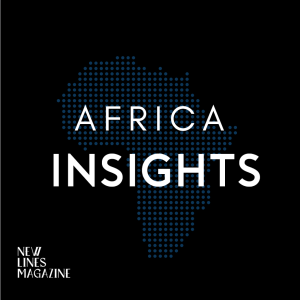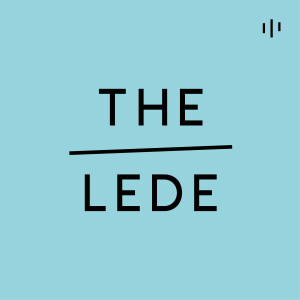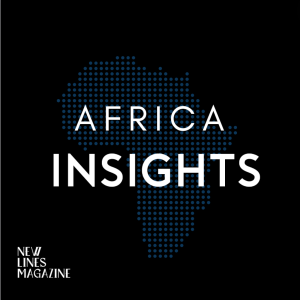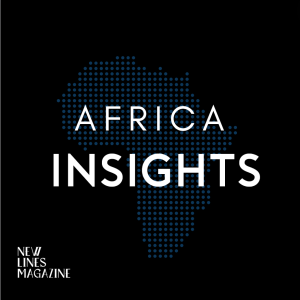Episodes

Friday Feb 02, 2024
Friday Feb 02, 2024
Every conflict is different, as Pierre Hazan knows all too well. The veteran negotiator and senior adviser on transitional justice with the Centre for Humanitarian Dialogue has witnessed many wars, including those in the former Yugoslavia and the Central African Republic. And while no two are the same, more often than not they start from the same place.
“Very often you start by what we call ‘Track Two,’” Hazan, author of the recently published book “Negotiating with the Devil: Inside the World of Armed Conflict Mediation,” tells New Lines’ Lydia Wilson. “You try to approach different people that are ready to talk to the other side. It’s a period of testing the different red lines to better understand the dynamics of each side.”
Hazan explains that much of the work of the conflict mediation happens away from the negotiating table.
“Very often it could be dangerous to go too fast and to want to have both sides together. They need to be ready to do that; they need to have elaborated their red lines; they need to have elaborated their strategy. So you spend a lot of time working separately with each group.”
Hazan and Wilson discuss the underlying tension between choosing to pursue peace on the one hand or justice on the other. Hazan recalls meeting a Western ambassador. “He said, ‘It’s so bizarre — I just had a whiskey with Milosevic and some people here want to indict him. How does it work? Do we want to make peace or do we want this man behind bars?’”
Negotiation usually involves a compromise with powerful people who might have committed horrendous acts.
“Sometimes the imperative is to get the war to stop, and people stop getting killed and justice will come later. But you will try at the same time to introduce some elements of justice even during the peace process,” Hazan says. “Human rights documentations and other things could be important because also it gives hope to the victims, to the society at large. They can imagine a process of reconstruction.”
Hazan and Wilson debate the nature of the International Court of Justice’s recent findings in the case of South Africa’s case against Israel for a potential breach of the Genocide Convention. But Hazan notes the case’s effect on the multiple tracks of negotiation currently taking place in the context of the Gaza conflict.
Wilson challenges Hazan on his contention that it is always necessary to take the immediate option to save lives, as she argues that in the case of Syria such a choice might have led to a greater death toll in the conflict in that country. Hazan, however, notes the example of the 1995 massacre in Srebrenica of Bosniak Muslims, which he argues could have been averted.
“When you are confronted with excruciating dilemmas, you are trying to identify the lesser evil,” Hazan says. “It’s not a perfect solution. It’s not even a good solution, but it’s possibly a lesser evil.”
Produced by Finbar Anderson

Monday Jan 29, 2024
Monday Jan 29, 2024
In the era of social media, women worldwide have harnessed its power to build strong feminist movements and activist networks to raise awareness about sexual harassment and violence. Social media has provided a platform for women to share their experiences and speak out against gender-based violence. Hashtags such as #MeToo, #BelieveWomen and #ImWithHer have gained global popularity and given women a space to come out and share their stories.
But as these spaces have grown, so have parallel, counter-feminist ones promoting toxic masculinity.
The “manosphere,” an online space promoting toxic masculinity, misogyny and anti-feminism, is rapidly growing in Africa, particularly in Kenya and South Africa, where gender-based violence is already rife.
In Kenya, the manosphere has been associated with disturbing and toxic content denigrating women and promoting violence against them. In January, the country witnessed two gruesome cold-blooded murders of women, crimes that have both sparked outrage and fueled a disturbing trend of victim-blaming among internet users.
“There was a backlash coming from men who generally held the views that women should do more to secure their own safety, that women should not have been in those situations,” Caroline Kimeu, the Guardian’s East Africa global development correspondent tells New Lines’ Kwangu Liwewe.
Similarly, in South Africa, a country that boasts of one of Africa’s most progressive laws against hate speech, online movements have been linked to violent and sexualized hate speech targeting women.
“They know where to push the boundaries, they know where they are protected and they know how to protect themselves and get around the law,” Rosie Motene, a South African author and feminist tells New Lines.

Friday Jan 26, 2024
Friday Jan 26, 2024
The small town of Ayodhya in northern India has long been a major flashpoint for communal tensions in the country. Believed by Hindus to be the birthplace of Rama, one of the most revered gods in Hinduism, it was also the site of the 16th century Babri Mosque. Enmity between Hindus and Muslims over the site grew through the 20th century before reaching its climax in 1992, when leaders of Hindu nationalist organizations, including the Bharatiya Janata Party (BJP), incited a crowd of activists to tear the mosque down.
“About 3,000 people died across the country in the aftermath of the demolition of the Babri Masjid,” Nilanjan Mukhopadhyay, author of upcoming book “The Demolition, the Verdict and the Temple,” tells New Lines’ Surbhi Gupta. “So you can well imagine that it led to a bad bout of communal violence, which went on for a fairly long period of time.”
The controversy didn’t end there. After decades of legal battles, the Supreme Court permitted a Hindu house of worship to be built on the site, and on Jan. 22, Indian Prime Minister Narendra Modi presided over the idol consecration ceremony at the opening of the Ram Temple.
“All lines between religion and politics got blurred,” says Mukhopadhyay. “This entire ceremony was facilitated by the Indian state.”
Modi and the BJP are poised to win a third term in the coming spring’s general election, which Mukhopadhyay attributes to his embrace of sectarian, far-right politics. Though this in itself is nothing new — hostility toward minority religions has always been a big part of the Modi ‘brand’ — Mukhopadhyay says the opening of the temple marks a concerning intensification of the religious aspects of the prime minister’s politics. For a nation founded as a secular democracy, it is a major departure from India’s traditional norms.
“It's a question of myth making,” Mukhopadhyay says. “We’re seeing the emergence of political Hinduism, with Mr. Modi being the chief priest.”
Produced by Finbar Anderson and Joshua Martin

Friday Jan 19, 2024
Friday Jan 19, 2024
Ian Mortimer is frustrated. The historian and author of “Medieval Horizons: Why the Middle Ages Matter” says the problem is that most people seem to think they don’t.
“You realize how little people know about the world around them,” Mortimer tells New Lines magazine’s Lydia Wilson. “They tend to make judgments based on the world as it is today.”
But that tells you only half the story. “If you've got the perspective of a thousand years or more, you realize that actually we don't get a very good picture of humanity by just looking at ourselves as we are today. You get a much fuller picture by looking at the past.”
That would be a lot easier if we didn’t tend to think that we know that picture already.
“We already have set preconceptions on the Middle Ages,” he says. “Okay, let's scrub everything we know.”
In other words, forget everything that comes to mind when you hear the word medieval. Forget the associations with ignorance, violence and superstition. You could even, Mortimer suggests, forget the word itself.
“The labels we put on these things don't matter. These are all modern constructs,” he points out. “The more we overlay the past with these constructs, we're actually putting barriers to our understanding — and looking at the Middle Ages shows you how we could live in very different circumstances and yet thrive and survive.”
Looking at it that way recontextualizes the usual stereotype of medieval people as violent and warlike. Our imaginary version of the period is dominated by glorified warrior figures like knights, vikings and conquering queens. Mortimer points out that this glorification was not unreasonable in a time without a strong central authority or democratic institutions to manage conflict. “They can't avoid war. It's a feature of everyday life. War is normal, and therefore to be good at war is a good thing, and by implication, great warriors are great people.”
It was over the course of the Middle Ages that that began to change. But, Mortimer warns, it would be a mistake to view this as a matter of straightforward progress. The long view of history shows that the basic coercive logic of the Medieval world is quite alive in our own societies.
“If you only count enacted violence, yes, we've got much more peaceful,” he says. “But what we've done is taken the real violence and created these threats, which are so powerful that we use them less and less — the ultimate being, of course, nuclear weapons.”
“So I think in the big scheme of things, since the Middle Ages, we have created a lot more potential violence and just locked it up for future generations to unleash.”
Produced by Joshua Martin

Tuesday Jan 16, 2024
Tuesday Jan 16, 2024
South Africa’s recent filing of a lawsuit in the International Court of Justice accusing Israel of committing genocide has sparked worldwide attention.
The case, which accuses Israel of committing genocide and war crimes in Gaza, has reignited discussions about South Africa’s post-apartheid history and its evolving position in the global political landscape.
Despite being celebrated for overcoming racism, South Africa has struggled with internal challenges, including sporadic and sometimes deadly violence targeting Black foreign nationals.
For more than three decades, foreign Black Africans have borne the brunt of widespread and recurring xenophobic attacks, with many having their businesses looted, while others have violently lost their lives.
The attacks stem from the belief that foreigners are to blame for South Africa’s social and economic woes. Many locals blame immigrants for taking their jobs and driving the unemployment level up.
“When we look at the statistics, when we look at the murder rate, the crime rate, we see that ever since Black foreigners were allowed to come to South Africa from independence, when we got freedom in South Africa, the crime rate has gone down by over 300%,” Rutendo Matinyarare tells New Lines’ Kwangu Liwewe.
Another aspect of the rise in xenophobia is belief in South Africa’s exceptionalism. This sense of exceptionalism has led many to see themselves as superior to the rest of the continent, which has led to widespread anti-immigrant sentiments and attacks.
“The thinking that was entrenched during apartheid was that South Africa is exceptional, that we are an exception and not like other African countries, as if we are not part of Africa,” Ntsikelelo Breakfast tells New lines.

Friday Jan 12, 2024
Friday Jan 12, 2024
Can France be fixed? The beleaguered nation faces crumbling institutions, civil strife and economic stagnation. But despite deep political divisions, the French public still seem to agree on one thing at least: something has gone very wrong. In her new book, “Fixing France: How to Repair a Broken Republic,” French journalist Nabila Ramdani digs deep into the nation’s history in search of the answers.
“There is this great dichotomy at the heart of the French Republic that stems from its very constitution,” she tells New Lines magazine’s Faisal Al Yafai. “France is built on impossible idealism, born out of revolutions, and this is why myths are so important for holding it together.”
Of course, there’s nothing unique about having a national mythology. All nations do, to some extent. But France stands out for its persistent consecration of those ideals in public life— “a glorious republic, built on high ideals of liberty, equality, and fraternity for all,” as Ramdani puts it — even as those promises seem increasingly thin and misguided to many of its people.
“That’s why the country is in such a crisis, because millions of French citizens are far more pragmatic than that,” she explains. “There's a massive gulf between France, the myth, and France, reality. And they are very different worlds indeed.”
Though Ramdani’s critique is broad, drawing on a wide range of political, historical and cultural factors — an all-powerful president, paramilitary policing, postcolonial anxiety and anti-immigrant xenophobia all among them — that gulf, she believes, may lie at the heart of all of them. Yet the country’s elite still cling to the myth, even as increasing numbers of French citizens conclude that the system is no longer working for them.
“That's really what my book is about. It's about state institutions that are outdated. It's about the Paris establishment that is looking after its own interests,” she says. “As former president Charles de Gaulle himself said, France is a perpetual illusion and it's very hard to reform.”
Produced by Joshua Martin
Friday Jan 05, 2024
Friday Jan 05, 2024
Iran was set ablaze last year after Mahsa Amini was taken into custody and beaten to death by the country’s morality police in Tehran for wearing “improper hijab.” The killing of the 22-year-old struck a deep chord among Iranians, inspiring protests in more than 100 cities throughout the country, marking the largest uprising Iran had seen since the 1979 revolution. Government reprisals were severe, with hundreds if not thousands of protesters arrested and tortured and several of them executed.
“The volume of art and creative responses that we've seen to this uprising is really unprecedented,”says Nahid Siamdoust, author of “Soundtrack of the Revolution: The Politics of Music in Iran” and host of the podcast “Woman, Life, Freedom.” “Even in comparison to 1979, I think this is unprecedented.”
“In a sense, the ‘Woman, Life, Freedom’ revolution is a revolution that's formed by culture, by art, by music, by poetry,” Malu Halasa, literary editor of The Markaz Review, tells New Lines magazine’s Danny Postel. It’s that art that is the subject of her new book, an edited anthology titled “Woman, Life, Freedom: Voices and Art from the Women's Protests in Iran,” which was released this month.
Unlike previous, more reformist protest movements in Iran, the Mahsa Amini protests became genuinely revolutionary. That revolutionary feeling was channeled into a great range of art forms, but especially music and hip-hop in particular. “Hip-hop in the West has lost its power. We haven't really had conscious rap for quite a long time,” Halasa says. But in Iran, she adds, “even before the ‘Woman, Life, Freedom’ movement, hip-hop was very powerful. It was critical of the status quo. It wasn't just party music.”
Artists can pay a high price for speaking out against the regime. For his blistering lyrics in support of the movement, a 32-year-old rapper from Esfahan named Toomaj Salehi was arrested and eventually sentenced to six years in prison after being held in solitary confinement for 252 days. He is one of many artists who have become figureheads of the wider movement, his songs played at protests while demonstrators wield placards with his name and face.
It’s no accident that musicians have become such integral and iconic parts of the movement, Siamdoust says. “Music is still strictly regulated. Dance is certainly not permitted on the streets,” she explains, “I think it is because of the imposition of these rules that opposition necessarily takes this form.”
Produced by Joshua Martin. This episode originally aired September 22, 2023.

Tuesday Jan 02, 2024
Tuesday Jan 02, 2024
In October 2023, during his inaugural visit to a Commonwealth nation as monarch, King Charles III conveyed his remorse to Kenyans for the violence inflicted by the British before the country gained independence.
Many elderly Kenyans were mistreated, raped and tortured by British colonial forces during the Mau Mau uprising (1951-1960). Kikuyu tribe members were held in detention camps that have been called “Britain’s gulag,” where they faced systematic torture and severe sexual assault.
However, during his recent visit Charles did not offer an apology. Such a step would take his country into “difficult legal territory,” said Neil Wigan, the British High Commissioner to Kenya, during the state visit.
“An apology shows that you have acknowledged and accepted that something very wrong was done,” Kenyan author and producer Salim Amin tells New Lines. “In terms of the country moving forward, for the Mau Mau fighters still alive, for them being apologized to would vindicate some of the things that happened to them.”
Charles’ acknowledgement follows a succession of European leaders who have recently spoken about their nations’ historical responsibilities for past abuses in their former colonies.
Denmark, France and the European Parliament have officially recognized past wrongs. Germany recently apologized to Tanzania two years after they also apologized for a genocide against the Herero and Nama tribes in Namibia.
There is undoubtedly a growing awareness of past abuses by the former colonial powers prompting them to come to terms with the past. Whether China and Russia’s growing influence on the continent is the driving factor, or societal pressures and demands for justice and reconciliation, still needs to be determined.
“It's certainly not pure realpolitik behavior and it’s certainly not pure altruism either, and it isn’t some sort of deeply felt effort to apologize for past atrocities either,” Brooks Spector, a former U.S. diplomat in Africa and East Asia, tells New Lines.
Africa Insights is hosted by Kwangu Liwewe and produced by Patrick Hagan.

Friday Dec 29, 2023
Friday Dec 29, 2023
“On the 7th of October I was on my way to a day out in the north of England with my family when I opened a news feed and found out that things are kicking off between Israel and Gaza,” Sharone Lifschitz tells New Lines magazine’s Joshua Martin. “My parents live about a mile from Gaza. I called my mom, and she didn't answer.”
By the evening, it had become clear that her parents were among the hostages kidnapped by Hamas. Her mother, Yochaved Lifschitz, was freed 16 days after the attacks, and images of her handshake with her former captor flashed around the world. Her father, Oded, remains in Hamas captivity. “So we are continuing to speak to whoever would listen in government and in media and try to advocate for their return.”
With over 200 hostages still in captivity in Gaza, it’s a nightmare she is far from alone in experiencing. “There's not one family who has not been affected,” she says. And yet many of those affected say that the Israeli government has all but abandoned them.
“The truth is that not only has the government not been forthcoming with them, but it's not clear what the government is doing, if anything, to get these hostages back,” says Noga Tarnopolsky, an Israeli journalist based in Jerusalem. “And so these families feel forsaken and abandoned.”
In the face of such apparent official indifference to their plight, some of the families have advocated for a bold proposal: everyone for everyone. In other words, release all of the Palestinians in Israeli detention — a number that has grown dramatically since the war began — in exchange for the hostages. “I am for everything that works,” Lifschitz says.
Tarnopolsky is more skeptical. “The offer has never been made in any way by Hamas,” she says. “I think that if this were a real offer, I think that the clamor for it would be so intense that the government would at least have to consider it.”
But such a prisoner swap remains the only real hope in the eyes of many of the families, who continue to push for it in the face of apparent government indifference. It may also be the only hope for some Palestinian detainees, many of whom are held without charge — and, according to civil rights groups, face serious human rights abuses in prison.
Since Oct. 7, Muzna Shihabi, a former adviser to the PLO negotiation team says, “according to Palestinian officials, the number has doubled.” Many, she says, report that their treatment has become even more severe over the past month.
But as long as Israel and Hamas remain as unwilling to negotiate as they currently seem to be, their plight — like those of the Israeli, Thai and other nationals held in Gaza — is unlikely to end anytime soon.
Produced by Joshua Martin. This episode originally aired November 10, 2023.

Friday Dec 22, 2023
Friday Dec 22, 2023
This year saw some major developments on the topic of Unidentified Anomalous Phenomena, or UAPs, also known as UFOs. Among these developments was the testimony of David Grusch, a career intelligence officer turned whistleblower, before Congress in July. He alleged that multiple United States defense and intelligence agencies had been illegally engaged in a secret “multidecade UAP crash retrieval and reverse engineering program;” that some of these crashed UAPs were piloted by “biologics” who were “nonhuman,” who are currently in U.S. custody; and that when he pressed the right authorities for more transparency on these programs, as he had been mandated to do by Congress, he was denied access and retaliated against.
This month, U.S. lawmakers, including those who have heard hours of additional testimony behind closed doors from Grusch and other former and active duty military and intelligence professionals, passed a bill that, for the first time, mandates the declassification and release of UAP records held by government agencies.
The bipartisan bill was co-sponsored by Senate Majority Leader Chuck Shumer and Sen. Mike Rounds, a Republican, and was passed in the Senate without resistance. But when it landed in the House, several Republican lawmakers demanded the removal of two key provisions.
In this episode, renowned civil rights lawyer Daniel Sheehan, who has been on the forefront of pushing for this legislation, joins Rasha Elass to talk about how we got here, why important provisions in the bill were removed and what we can expect moving forward, as lawmakers continue to push the government to disclose what it allegedly knows about nonhuman technology.
Produced by Rasha Elass and Patrick Hagan





